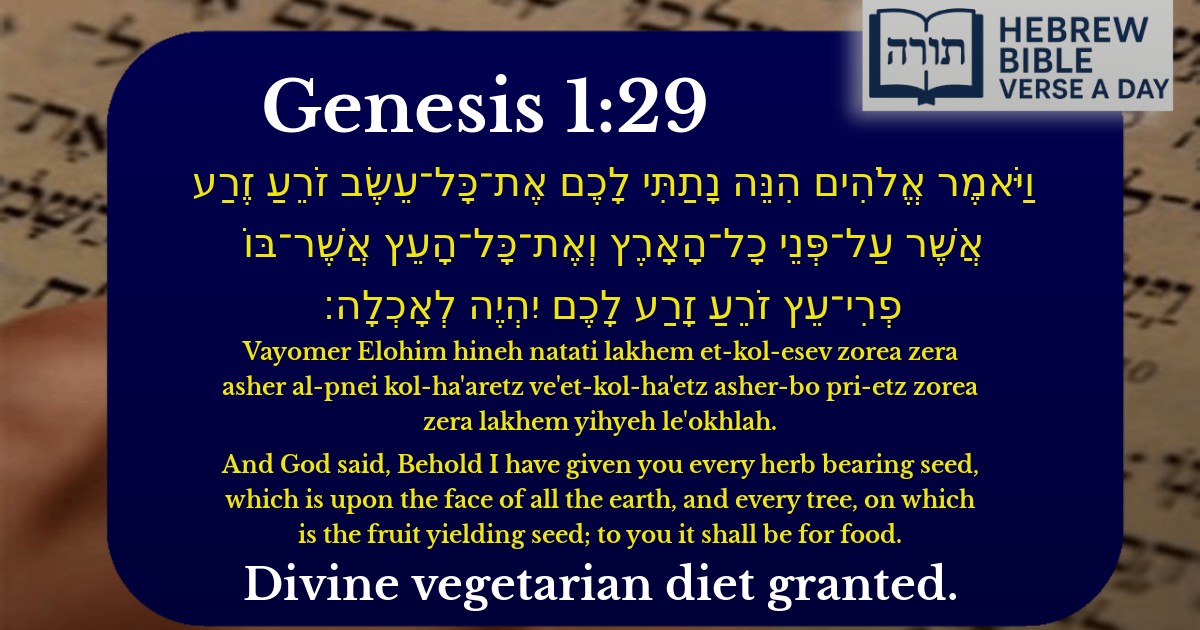Join Our Newsletter To Be Informed When New Videos Are Posted
Join the thousands of fellow Studends who rely on our videos to learn how to read the bible in Hebrew for free!
Hebrew Text
וַיֹּאמֶר אֱלֹהִים הִנֵּה נָתַתִּי לָכֶם אֶת־כָּל־עֵשֶׂב זֹרֵעַ זֶרַע אֲשֶׁר עַל־פְּנֵי כָל־הָאָרֶץ וְאֶת־כָּל־הָעֵץ אֲשֶׁר־בּוֹ פְרִי־עֵץ זֹרֵעַ זָרַע לָכֶם יִהְיֶה לְאָכְלָה׃
English Translation
And God said, Behold I have given you every herb bearing seed, which is upon the face of all the earth, and every tree, on which is the fruit yielding seed; to you it shall be for food.
Transliteration
Vayomer Elohim hineh natati lakhem et-kol-esev zorea zera asher al-pnei kol-ha'aretz ve'et-kol-ha'etz asher-bo pri-etz zorea zera lakhem yihyeh le'okhlah.
Hebrew Leining Text
וַיֹּ֣אמֶר אֱלֹהִ֗ים הִנֵּה֩ נָתַ֨תִּי לָכֶ֜ם אֶת־כׇּל־עֵ֣שֶׂב <b>׀</b> זֹרֵ֣עַ זֶ֗רַע אֲשֶׁר֙ עַל־פְּנֵ֣י כׇל־הָאָ֔רֶץ וְאֶת־כׇּל־הָעֵ֛ץ אֲשֶׁר־בּ֥וֹ פְרִי־עֵ֖ץ זֹרֵ֣עַ זָ֑רַע לָכֶ֥ם יִֽהְיֶ֖ה לְאׇכְלָֽה׃
וַיֹּ֣אמֶר אֱלֹהִ֗ים הִנֵּה֩ נָתַ֨תִּי לָכֶ֜ם אֶת־כׇּל־עֵ֣שֶׂב ׀ זֹרֵ֣עַ זֶ֗רַע אֲשֶׁר֙ עַל־פְּנֵ֣י כׇל־הָאָ֔רֶץ וְאֶת־כׇּל־הָעֵ֛ץ אֲשֶׁר־בּ֥וֹ פְרִי־עֵ֖ץ זֹרֵ֣עַ זָ֑רַע לָכֶ֥ם יִֽהְיֶ֖ה לְאׇכְלָֽה׃
🎵 Listen to leining
Parasha Commentary
📚 Talmud Citations
This verse is quoted in the Talmud.
📖 Sanhedrin 59b
The verse is discussed in the context of the dietary laws given to Adam and Eve, contrasting them with the later laws given to Noah and the Israelites.
📖 Avodah Zarah 54b
The verse is referenced in a discussion about the permissibility of certain foods and the original dietary permissions granted to humanity.


Divine Provision of Vegetation for Humanity
The verse (Bereshit 1:29) describes Hashem granting Adam and Chava permission to eat from all seed-bearing plants and trees. Rashi explains that this was the original dietary plan for mankind before the sin of Adam Harishon, when humans were permitted only plant-based foods. The Ramban adds that this demonstrates Hashem's kindness in providing abundant sustenance directly from the earth.
The Distinction Between Herbs and Trees
The Torah makes a distinction between:
The Sanctity of Food
The Sforno notes that the phrase "לָכֶם יִהְיֶה לְאָכְלָה" (to you it shall be for food) implies that these foods were given specifically for human benefit and consumption, teaching that eating should be done with proper intention and gratitude. The Talmud (Berachot 35a) derives from this verse that one must recite blessings before eating, recognizing Hashem as the ultimate provider.
Ethical Consumption
The Kli Yakar emphasizes that the wording "הִנֵּה נָתַתִּי" (Behold I have given) indicates a gift with conditions - that humanity must use these resources responsibly. This establishes the Jewish concept of ethical consumption and environmental stewardship (Bal Tashchit).
Pre-Sin Dietary Laws
According to Rambam (Hilchot Melachim 9:1), this verse represents the original, ideal state of creation where killing animals for food was unnecessary. Only after the Flood was meat permitted (as seen in Bereshit 9:3), showing a progression in human dietary allowances based on spiritual levels.